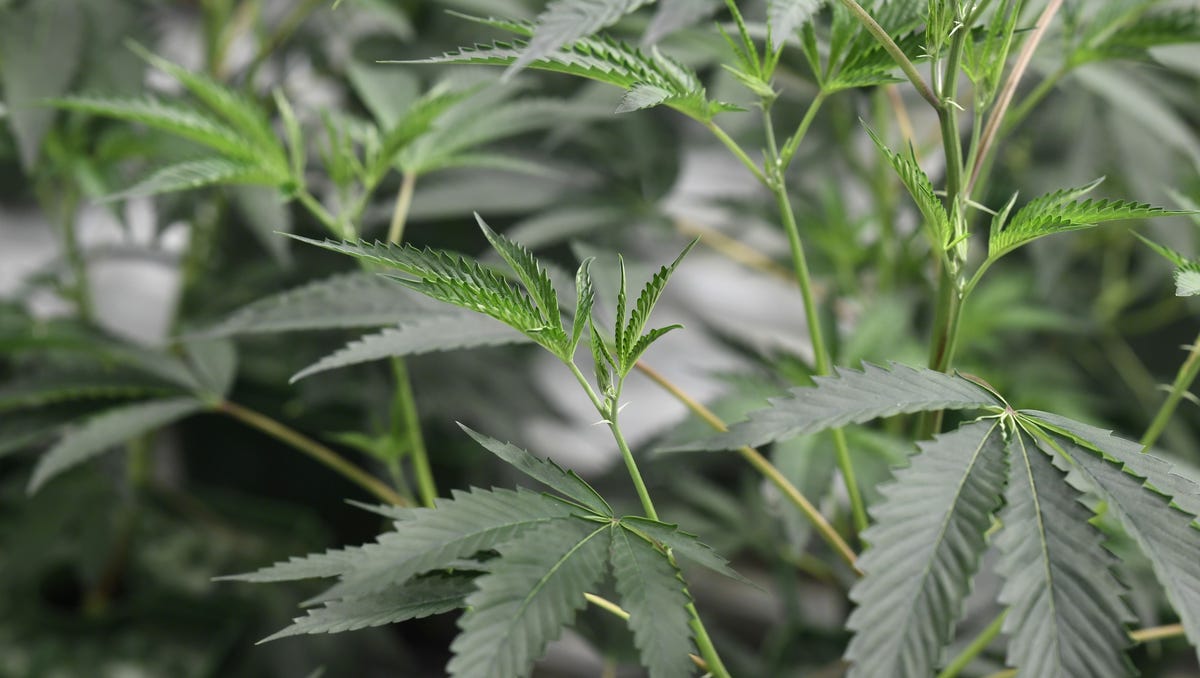
Push for legal pot in PA clears committee, GOP vexed by quick passage
PA state senators Dan Laughlin, Sharif Street unveil marijuana legalization bill
State Sens. Dan Laughlin, left, and Sharif Street introduce a bill to legalize marijuana at the Pennsylvania State Capitol Complex on Feb. 24, 2021.
Contributed video, CONTRIBUTED VIDEO
- Pennsylvania House Democrats advanced a bill to legalize recreational marijuana, sending it to the full chamber for a vote.
- The bill faces opposition in the Republican-controlled Senate, particularly regarding the proposed use of state-run dispensaries.
- Republicans criticized the bill’s swift introduction and passage, citing a lack of transparency and public input.
There was no slow burn on this bill.
Pennsylvania House Democrats on Sunday inflamed tensions with their Republican colleagues by introducing legislation that would legalize adult-use recreational marijuana and then passing the bill out of the Health Committee on a 14-12 party line vote just a day later. It now heads to the floor for a vote by the chamber.
The 175-page Cannabis Health and Safety Act, sponsored by state Reps. Rick Krajewski, D-Philadelphia, and Dan Frankel, D-Allegheny, legalizes adult-use cannabis for people age 21 and older, calls for it to be sold out of state-run stores, similar to how the state conducts liquor sales, and to be regulated by the Liquor Control Board.
Senate opposition
If H.B. 1200 passes the narrowly held Democratic-run chamber, it has an uphill battle in the Republican-controlled Senate.
State Sen. Dan Laughlin, R-Erie, who was the first GOP officeholder in Pennsylvania to support legalization of marijuana for recreational purposes, said the bill won’t make it out of the Law & Justice Committee, which he chairs, if it includes the provision of using state liquor stores as dispensaries.
“I’ve been clear about that right along,” he told the USA TODAY Network. “I’ve introduced a standalone bill that will create the Pennsylvania Cannabis Control Board. I think that is needed regardless. The House bill seeks to expand the Liquor Control Board to include cannabis. I’m also opposed to that.”
Gov. Josh Shapiro has supported legalization in his three budget proposals since taking office.
Twenty-four states — including five of the six states bordering Pennsylvania — have fully legalized marijuana in recent years.
The few Republicans who have joined their Democratic colleagues in backing legalization have argued that Pennsylvania is losing tax revenue to neighboring states and legalization is inevitable.
The Cannabis Health and Safety Act could generate more than $500 million annually in taxes and profits for the state.
What’s in the bill?
The bill’s sponsors, Krajewski and Frankel, said their bill will avoid the “missteps” made by other states by using an “alternative retail model” — state-run dispensaries — instead of handing over profits from sales to out-of-state corporations. “The cannabis industry has been monopolized by corporatized private equity and it is time to propose an alternative retail model that will benefit all Pennsylvanians.”
Profits would be redirected to “small businesses and taxpayers,” including “communities disproportionately harmed by the war on drugs,” according to the sponsors. The legislation would establish the Cannabis Revenue Fund and two restricted accounts, the Communities Reimagined and Reinvestment account and the Substance Use Disorder Prevention, Treatment and Education account.
As with similar proposals, people with prior marijuana use and possession convictions would have their records expunged automatically. The bill would prohibit employers from discriminating against employees based on a person’s use of marijuana outside the workplace or if a cannabis metabolites are found in a person’s hair, blood, urine of other bodily fluids during a drug screening.
People would also be able to obtain a home cultivation permit to grow two immature cannabis plants and two mature cannabis plants.
A ‘shady, rushed process’
The swift introduction and passage of the bill was heavily criticized by GOP members.
State Rep. Brad Roae, R-Erie/Crawford, accused House Democrats of “stealing democracy” by quickly advancing H.B. 1200 and attempting to pass a bill dealing with changes to the election code.
“They are operating under the ‘we need to pass it first to find out what’s in it later’ method of quickly bringing up large, complex bills for committee votes,” Roae said in a statement Tuesday. “Democracy is at risk when elected representatives have to vote on bills before the public even has a chance to offer its input.”
State Rep. Charity Grimm Krupa, R-Fayette, who serves on the House Health Committee, said committee Democrats withheld bill language from fellow members and the public on Sunday, despite calls from state Rep. Kathy Rapp, the minority chair of the committee, to release it.
“This shady, rushed process is designed to ram through a massive policy change before members, stakeholders and the public have had a chance to review, discuss or understand the consequences,” Krupa said in a statement. “While Democrat leadership may technically be following the letter of the law, they are trampling all over the spirit of Pennsylvania’s sunshine laws and procedural rules, rules that exist to ensure transparency, deliberation and accountability.”
‘The time is now’
In a joint statement, Krajewski and Frankel expressed urgency in passing the legislation and described past efforts to review, study and receive input on the issue.
Krajewski said he led six public hearings last legislative session on adult-use legalization.
“The time is now for Pennsylvania,” he said. “We have listened carefully to public health experts, criminal justice reformers, small business advocates and community leaders. Our bill reflects what we’ve learned — that we can and must legalize cannabis in a way that is safe, equitable and beneficial to all Pennsylvanians.”
Matthew Rink can be reached at mrink@timesnews.com or on X at @ETNRink.
No Byline Policy
Editorial Guidelines
Corrections Policy
Source